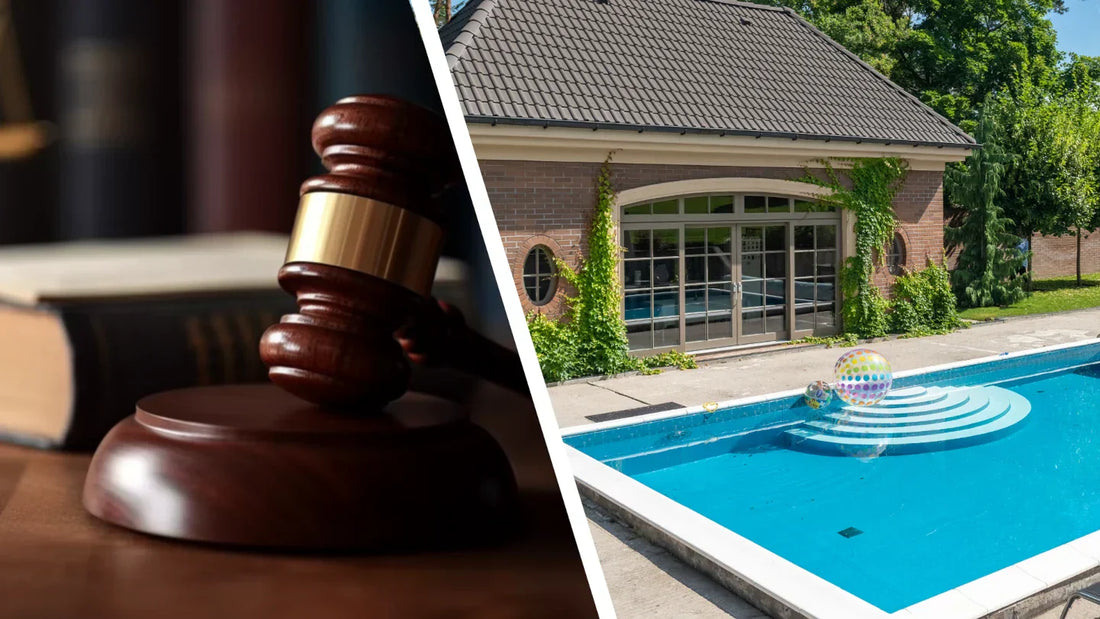This article deals with the penalties for failing to install a safety device in a private swimming pool in France and is part of a series of articles on safety requirements for swimming pools: Which swimming pools are concerned by the obligation to install a safety device?
In France, the law imposes strict obligations on owners of private swimming pools to prevent the risk of drowning. Failure to comply with the rules in force can result in severe penalties, with a fine of up to €45,000 if a compulsory safety device is not fitted, and even criminal sanctions in the event of an accident if the owner is found to be negligent. This article tells you more about the legal obligations, the risks involved and the importance of raising awareness.
Legal obligations for owners of private swimming pools in France
Under French law no. 2003-9 of 3 January 2003, owners of unenclosed private swimming pools for individual or collective use are required to install a standardised safety device.
Compulsory devices
The pool owner must install at least one of the following four types of protection:
- Barrier
- Alarm
- Safety cover
- Shelter
Enclosed, above-ground, inflatable or demountable swimming pools are not covered by this obligation to install a safety device.
For more information, see our article on: Keeping children safe near swimming pools: what are the options?
Safety standards to be met in France
Each device must meet the requirements of the corresponding standards issued by the French agency AFNOR:
- Barrier (standard NF P90-306): must prevent the passage of children under 5 years of age without the help of an adult, and resist their actions without injuring them (including the locking system)
- Alarm (standard NF P90-307): must detect any crossing by a child under the age of 5 and trigger a warning device consisting of a siren, which cannot be activated or deactivated by a child under the age of 5
- Safety cover (standard NF P90-308): must prevent the unintentional immersion of children under the age of 5 and withstand being stepped on by an adult without causing injury
- Shelter (standard NF P90-309): must make access to the pool inaccessible to children under 5 years of age when closed
For the construction of new swimming pools, the compulsory protection must be installed at the latest when the pool is filled with water, or when the work on the pool is completed if it has to be filled with water beforehand.
The anti-drowning T-shirt
Despite the compulsory nature of the devices listed above, and the need for constant supervision, drowning is the leading cause of accidents in everyday life among children under the age of 6, with 500 victims a year in France, most of them in private swimming pools and when children are not supposed to be swimming.
That's why a complementary system like the anti-drowning T-shirt is still very useful for further improving safety around swimming pools. This T-shirt incorporates a lifejacket that inflates automatically if the child is submerged, bringing him or her to the surface and keeping the airways out of the water.
Risks incurred in the event of non-compliance
Penalties
As mentioned in Article L183-13 of the French Construction and Housing Code, the absence of an approved safety device for pools covered by this obligation exposes the pool owner to a €45,000 fine in France.
Only the owner is held responsible; the pool installer or vendor has a duty to provide information, but does not relieve the owner of the obligation to install a suitable safety device.
Possible criminal sanctions
In France, if a child drowns because there is no safety device, the pool owner can be prosecuted for manslaughter.
As mentioned in Article 221-6 of the French Criminal Code :
- In the case of clumsiness or negligence deemed to be unintentional, the owner risks a €45,000 fine and a 3-year prison sentence;
- If the breach of the safety obligation is manifestly deliberate, the owner risks a €75,000 fine and 5 years' imprisonment.
The importance of raising owners' awareness
Preventing accidents
Drowning is a real risk, particularly for young children. Raising awareness among pool owners is not just about installing safety devices. It also includes educating pool users about essential safety rules.
This includes:
- constant supervision of children, particularly around the pool
- learning to swim from an early age
- respect for basic safety rules, including when bathing is authorized (don't run along the shore, don't dive into shallow areas, etc.)
- do not leave toys or other floating objects in the water after swimming, as they may attract children
- training in first aid techniques
Guaranteeing a safe bathing environment
Swimming pool safety is not just about compulsory devices. A safe swimming environment also means:
- regular maintenance of the pool and its equipment
- checking that safety devices are working properly
- the installation of adequate lighting for night-time bathing
- a first-aid kit near the pool
- when swimming, keep additional safety equipment (pole, buoy, etc.) and a telephone handy to call for help if necessary
- communicating and applying clear rules for use of the pool
Declaration of swimming pools in France
Declaration regulations in France
French regulations governing the declaration of swimming pools vary depending on the type of work, the pool and the size of the pool.
For in-ground or semi-inground pools:
- Swimming pools of less than 10 m² generally do not require a declaration, unless they are located in a protected area (in which case a prior declaration must be made at the town hall) or there is a specific rule in the local urban masterplan.
- Pools of between 10 m² and 100 m² require a preliminary works declaration. The addition of a shelter over 1.80 m high requires a building permit.
- Swimming pools over 100 m² require a building permit.
For above-ground pools:
- Installation period of less than 3 months per year (or 15 days in a protected area): no declaration required unless there is a specific rule in the local urban masterplan.
- Pools installed for more than 3 months a year (or 15 days in a protected area): the rules are the same as for in-ground or semi-inground pools, depending on the surface area of the pool (and the size of the shelter, where applicable).
Failure to declare a swimming pool may result in administrative and financial penalties in France.
Civil liability of owners
Swimming pool owners are liable for any accidents that occur in their pool. It is therefore essential to take out appropriate civil liability insurance, which covers bodily injury and property damage caused to third parties. The insurer may offer options to the home insurance policy.
It is important to note that even with insurance, in France, the owner can be prosecuted in the event of gross negligence.
French law requires the installation of an approved safety device for private pools that are not enclosed and where the pool is totally or partially in the ground. Failure to comply with these regulations can result in a €45,000 fine for the pool owner, and even criminal prosecution in the event of an accident.




